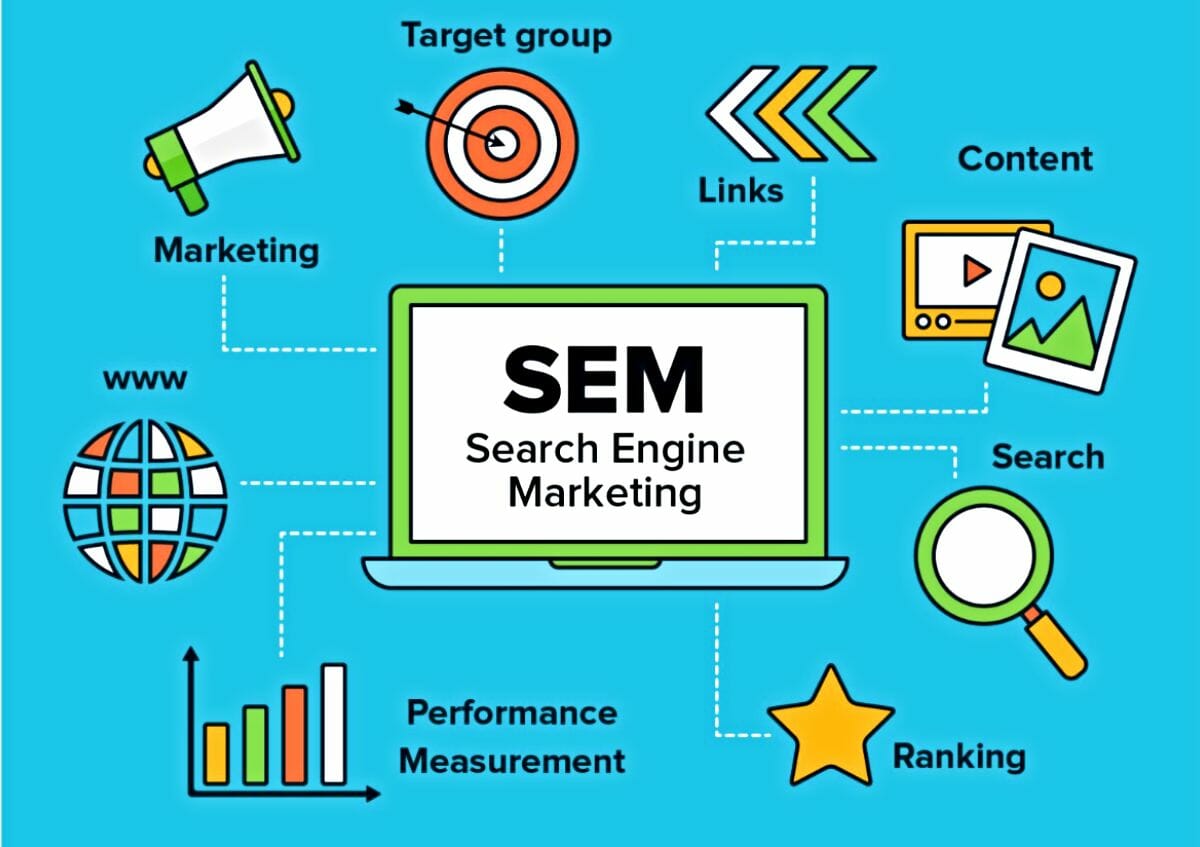Search engine marketing or SEM is a good way to grow your enterprise in an aggressive business landscape. With thousands of brands out there competing for the same customers, it has never been more crucial to advertise over the internet, and search engine marketing is an effective way to get it done. In this post, you will learn what search engine marketing is and gain basic skills about getting started and gaining returns.
What is search engine marketing?
Search engine marketing is a technique that relies on the use of paid advertisements that appear on search engine results pages, and it is at times referred to as “pay per click” advertising. SEM requires marketers to compete against each other for specific keywords or phrases, and the winner gets to have their advertisement appear whenever users search for a specific keyword. These ads may appear in various formats. While some may be small text-based promotions, others, such as product listings, are more attractive, and they allow viewers to see all the pertinent product information at a glance.
SEM’s biggest benefit is that it allows advertisers to place their offers directly in front of motivated consumers, many of whom are on the verge of making a purchase; no other advertising channel can achieve a similar result.
SEO vs. SEM
In general terms, search engine marketing deals with paid search marketing. Advertisers must pay for their advertisements to appear in search results. Search engine optimization, on the other hand, doesn’t require users to pay before their content to appear in search results. They earn free positions because they have the most relevant content.
SEM and SEO are critical parts of online marketing. SEO is an effective way to drive internet users to get to know about your business, and search engine marketing is a cost-efficient way to get consumers to buy products or services from your business.
SEM techniques
Keywords Research
Keywords are the backbone of search engine marketing. Since users enter these words into Google, Bing, and other similar services, it goes without saying that they are critical to effective digital marketing.
Before you decide which keywords to target for your marketing campaign, you should conduct extensive research. First, you need to identify which keywords are relevant to your business, then sort them to find those that draw the most search traffic. There are plenty of tools to do this; you could use Google’s keyword planner as it is free and highly effective.
Besides helping you identify the words to use for your bids, keyword research will reveal negative keywords – search terms that should be excluded from your marketing campaign. Negative keywords aren’t really negative. Rather, whenever they’re used, they imply a user is not interested in the products or services you offer.
Keyword categorization and account structure
Another important aspect of keywords that will help your search engine marketing succeed is account structure. Logical keyword grouping and proper account structure will help you attain better click-through rates, low costs-per-click, and enhanced overall campaign performance. An effective account structure is composed of five separate elements.
They are listed below in descending order.
- Ad campaigns
- Ad groups
- Keywords
- Ad content
- Landing pages
Your ad campaigns can, and in most scenarios, should focus on related products. For instance, if you operate a gift shop, one advertising campaign should focus on Christmas gifts such as decorations, Christmas hats, and so on, while another campaign could focus on valentine’s gifts. Ad groups allow you to segment each campaign for increased relevance. From the previous example, one ad group could contain Christmas gifts for women, while another could focus on gifts for children. This level of order might prove cumbersome, but for rewards like improved efficiency, and click-through rates, it is worth the effort.
Search engine marketing auctions
One of the most prevalent misapprehensions about search engine marketing is that whomever has the biggest advertising budget wins. True, a large advertising budget is helpful, particularly when targeting highly competitive keywords. However, it is far from being a standard requirement for success. This is because all ads go through an auction process before they appear in search results.
How ad auctions work
The auction process occurs every time a user enters a search query into a search engine’s search bar. To participate in the auction, marketers specify the keywords they want to target and state how much they would spend for each click to have their promotions appear in Google’s search engine results for example. If Google finds that the specific keywords appear in a user search query, then the ads are placed in an auction.
Not all ads appear in search results. This is because the auction process considers several factors to determine ad placement within search engine results pages and because not all keywords reflect sufficient commercial intent to justify their appearance on a results page. The main factors Google considers during ad auctions are the maximum bid amount, and quality score. The Maximum bid is the highest amount an advertiser is willing to spend per click. Quality score, on the other hand, is Google’s measure of the general quality of an advertisement. Google combines these metrics to determine the placement of advertisements. The result of the calculation is known as ad rank. Considering that an advertisement’s quality score contributes half of the Ad-rank formula. Your ads must be of high quality. High-quality scores will help you attain better ad positioning even with a small budget.
Search engine marketing is a highly efficient marketing tool. Though it requires a significant upfront investment, it offers access to a highly profitable market segment. For this reason, it is worth adding to your digital marketing strategy. If you are still not sure how it could help your business, there are several digital marketing agencies in Uganda you can consult. Their guidance will help you make the best choice for your business.
 +256 206 300885
+256 206 300885


